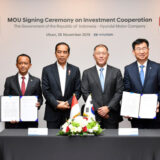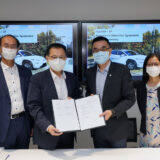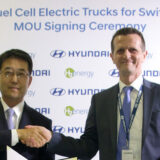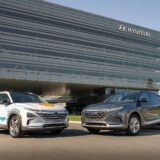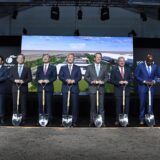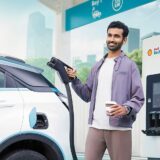
Hyundai Mobis’ new plants to produce 100K hydrogen fuel cells
Hyundai Mobis will build two new fuel cell plants in South Korea to accelerate the hydrogen economy and to secure broader global market dominance. With annual sales of USD30 billion, Hyundai Mobis, which belongs to the Hyundai Motor Group, is the seventh largest automotive supplier globally.
Hyundai Mobis will invest USD 1.1 billion on the two plants to be located in Incheon and Ulsan, South Korea. The two factories will perform different tasks in the manufacturing process of the fuel cell systems. Hyundai Mobis plans to start production in the second half of 2023. When fully operational, the facilities are expected to produce 100,000 hydrogen fuel cells every year.
On October 7, 2021, Hyundai Mobis held a groundbreaking ceremony for the new plant that will produce hydrogen fuel cell stacks at the Industrial Complex in Cheongna International City, Incheon. South Korean President Moon Jae-in and Deputy Prime Minister Hong Nam-ki attended the ceremony.
Gaining more momentum in the global race for hydrogen mobility
Hyundai Mobis, with the largest fuel cell production capacity in the world, is expected to gain even greater momentum in the global race for hydrogen mobility with the addition of new production locations. Once they are completed, Hyundai Mobis will operate a total of three fuel cells plants. In 2018, the company became the world’s first to set up a complete production system from fuel cell stack to the rest of the electronic components in Chungju. The Chungju plant is capable of producing approximately 23,000 hydrogen cell systems a year.
“Despite uncertainties including Covid-19, we have decided to make this large-scale investment to secure the market-leading competitiveness in the global fuel cell industry. We will continue to invest more in facilities and strengthen our R&D capability for the development of the hydrogen industry and expand the ecosystem.”, said Sung Hwan Cho, president and CEO of Hyundai Mobis.
With the completion of the new plants, Hyundai Mobis plans to expand its production lineups that apply fuel cell systems and diversify its hydrogen business. Most fuel cell systems produced by Hyundai Mobis are used in fuel cell electric vehicles (EVs) but the company is expected to scale its business to other sectors such as construction machinery and logistics equipment.
Last year, Hyundai Mobis developed fuel cell power packs that go into hydrogen forklifts, opening up the possibility for entry into the construction machinery sector. The hydrogen power packs used forklifts are generators that produce electricity on their own by combining a fuel cell stack, a hydrogen tank, and a cooling device.
Now the company is developing power packs for hydrogen-fueled excavator and plans to enlarge the fuel cell systems for small air mobility.





.png)
